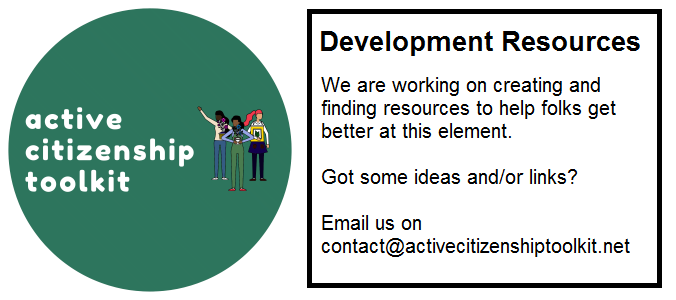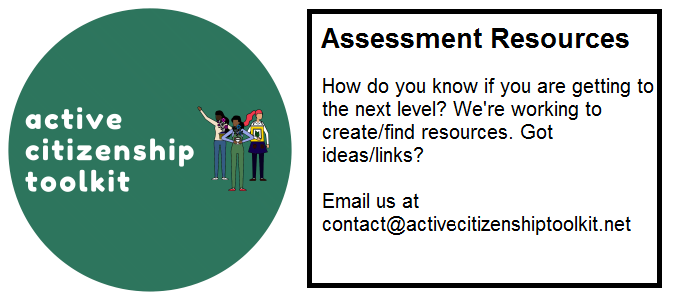Element Descriptor
Getting feedback on current performance is extremely helpful. But it’s a can of worms and doing it well is harder than it looks. Modelling doing it well can help other people.Not being able to take feedback means that insights into how things could be better, how an individual or group could be achieving its potential, will stop being offered, demoralising people who can see things need to change, and creating a false sense of adequacy.
Level descriptors
| Novice | Practitioner | Expert | Ninja |
|---|---|---|---|
| Can take feedback on performance from a trusted individual who has spent time in preparing the feedback, done a little praise-sandwiching and has a list of specific concrete steps which you can take to improve performance on elements which are not core to your identity, without serious ego-defence mechanisms kicking in. | Can understand and act on feedback from a semi-trusted individual who is giving semi-coherent and relatively unstructured/non-specific feedback about an issue which ‘matters’ to you, with only very mild ego-defence mechanisms kicking in. | Can understand and act upon feedback from individuals in public settings who are giving diverse and occasionally in-tension-if-not-actually-contradictory which is delivered with a side order of passive-aggression/snarks and/or underhanded jabs, without ego-defence mechanisms getting in the way. | Can understand, assess and absorb contradictory and demeaningly-meant feedback from multiple sources in public forums without getting unduly defensive, and without activating any defence mechanisms, without looking like a sycophant or a sociopath |
Element Overview Essay
This is a draft. If something doesn’t make sense, or you see typos, or if you have further ideas, please email us on contact@activecitizenshiptoolkit.net
This is usually done quite badly for a number of reasons. Number one, people are afraid to take a compliment and feedback that was good because they’re afraid they’ll get a big head or they’ll be perceived as having a big head being arrogant, smug, complacent, whatever. And here, Nietzsche’s concept of slave morality would be helpful for some
On the flip side, taking feedback from someone that is challenging and highlights that something that they you’ve done could have been done better or quicker or on time or whatever – unless you learn to bite down on your defensiveness and to just accept it, you’ll be defensive and then the other person will get pissed off that you’re being defensive. And then you see this all the time, especially around really sensitive subjects, like being or doing allyship, you know, someone will fuck up, someone will try and gently call them out on it, and then it will become a “yeah but no, but” or “it wasn’t my party”, etc, etc.
So, the consequences of you being bad at taking feedback are huge, because people stop giving you compliments. And then you think, “Well fuck, what did I do wrong, why they’re being assholes to me”, even if you don’t say that explicitly. And they stopped giving you feedback that will help you improve, because they’re afraid of getting a load of abuse, and then you miss out on other people’s judgments of how you could do things. They stop caring, they stop seeing it. The group, individual and group performance can drop.
And this is really important for a group. If individuals within it are not taking feedback and there isn’t feedback on the group performance, there, how’s the group going to get better? I mean, it might just by osmosis or because a new person comes along or because someone takes it upon themselves to really up their skill level. I’m not saying performance improvement is impossible in the absence of being good at taking feedback, I’m saying it’s a lot less likely.
So obviously, in terms of advice for individuals and groups, they individuals, it’s about knowing what your triggers are explicitly requesting feedback. Maybe in certain formats, it might be that you’ve personally find it easier to get it in writing. Or it might be the opposite that you find to get it in person. Or verbally, you might want to instantly, or you might want it a couple of days later.
All of these can be managed at the group level. You need to invite anonymous feedback from people. And it needs to be built into your systems. But it’s got to be anonymous, as far as it can be. Because until people trust you that you’re not gonna leak down their throat, they’re gonna self censor.
I’m strongly of the opinion that asking for feedback that is not anonymized is worse than useless. And is a dick move generally.
Development Resources

Assessment Resources

